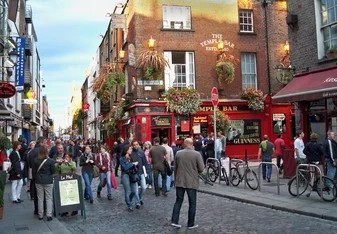
How to Study Abroad in Ireland
Interested in studying abroad on the Emerald Isle? Read on to learn about everything it takes to make your dream of Ireland a reality!

Photo credit: Jessyca L., Athlone Institute of Technology
After two separate trips to Ireland as a tourist in 2010 and 2014, I decided that these short stints were not enough for me. I wanted to live there and fully immerse myself in the country. Since getting a work visa to the EU as a non-EU citizen is pretty difficult, I went the study route. I had wanted to get my Master of Public Health and found that not only would completing a degree in Ireland give me the right to stay after graduation but that it was actually cheaper than studying in the US. I was sold and applied to University College Dublin. Not only did I get in, but I got a scholarship to boot!
Studying in Ireland was a priceless experience and opened many doors for me, both personally and professionally. I traveled extensively around the island, made friends and connections from all over the world, and ended up staying and working for a year after graduation. I can't say enough good things about my time there and wholeheartedly recommend studying in Ireland to anyone who's interested.
While the journey from application to attendance was straightforward in some ways, it was complicated in others. Regardless of the challenges though, I was able to successfully navigate the process alone -- and so can you! We're here to help you understand the steps to study abroad in Ireland, from the pesky bureaucracy to the fun stuff you can get involved in once you're there.
Is Ireland a good place to study abroad?
In 2019-2020, Ireland was the 6th most popular study abroad destination for US university students. With its combination of world-class universities, notoriously friendly locals, and plethora of cultural and outdoor activities to enjoy, it's no wonder that international students love studying abroad in Ireland.
How much does it cost to study abroad in Ireland?
Tuition prices and overall cost of living in Ireland aren't among the cheapest for other top choices but you can still find ways to save money while studying abroad on the Emerald Isle. We go into some average costs below but we also have a detailed article on the subject!
1. Research programs and universities

Photo credit: Molly G., ISA
With a higher education system that boasts several top universities worldwide, there is an excellent school for everyone dreaming of studying on the island. Nine universities plus a host of colleges and institutes of technology mean you are bound to find the perfect fit for your study abroad education.
Read more: Where in Ireland Should You Study Abroad?
Direct enrollment vs. third-party provider
The first step in preparing to study abroad in Ireland is choosing how you want to do it. When studying abroad you have a few options for enrollment including enrolling directly on your own, going through an exchange or faculty-led program at your university, or signing up with a third-party provider who handles registration, accommodation, and provides support.
Read more: The Best Universities in Ireland for International Students
Compare the various costs
To help you get an idea of the cost of studying abroad in Ireland, we've outlined the average tuition costs for direct enrollment vs. using a third-party provider as well as the general cost of living numbers. These are estimates and the actual cost will depend on which university or program you choose coupled with your own personal spending habits.
University costs
- Average cost through a third-party provider (includes housing): $8,000-$17,000 per semester
- Average cost through direct enrollment (does not include housing): $5,500-$11,000 per semester
Monthly cost of living
- Rent for room in shared apartment: $700-$1100
- Utilities: $30-$55
- Groceries: $280-$400
- Cell phone plan: $20-$30
- Transportation pass: $70-$95
Source: Education in Ireland and University College Cork
To compare your options and see how much you could save by enrolling directly at the Irish university of your choice, check out our cost comparison tool.
Apply early
Complete and submit applications to your institutions of choice as early as possible. Regularly check the international office at the university you applied to to stay updated on your application process and any international students' news. You must formally enroll in a course (program) and pay for your studies before arriving in Ireland.
And speaking of applying early -- if you don't already have a passport, start gathering your application materials and submit everything ASAP. According to State.gov, current processing times stand at 8-11 weeks. If you have a passport, ensure it is valid for at least six months after you plan on returning to your home country.
2. Prepare your documents prior to travel

Photo credit: Olivia E. IES Abroad
As a student entering Ireland, you will need to prove your "reason for stay" to an immigration officer at border control. You will need to present the following:
- Passport
- Proof of university enrollment
- Documents proving you can support yourself financially (€3,000 for stays of more than 6 months or €500 per month for stays less than 6 months).
- Proof of medical insurance
It might also be helpful to bring details of where you'll stay until you find more permanent accommodation. It's up to you to present a clear case for being admitted to the country. The Immigration Officer may not let you in if you're missing important documents so be prepared!
You must also give the Immigration Officer a printed receipt of your completed Public Health Passenger Locator Form, a document used for COVID-19 contact tracing. This is a pre-boarding requirement and must be completed before you arrive.
3. Pack your bags
You've gotten registered for classes and have prepared your travel documents -- it's getting real! Next up on your list is packing. What exactly should you pack for your study abroad in Ireland? Here are some tips to help you out.
Less is more
It's tempting to lug two jam-packed suitcases and a large carry-on with you as you jet off to Ireland. Packing as light as possible is definitely the best way forward when studying abroad, though. My experience from overpacking in my early days of travel taught me that you'll probably not need a lot of the things you brought. This excess of stuff ends up being a headache. Only take the basics and what can't be bought on the spot if needed. Some good things to bring along include:
- Laptop
- A good camera (although your phone will likely be fine, too!)
- Boots/sturdy walking shoes
- A dressy outfit and shoes to match
- Raincoat/windbreaker
Consider the weather
Ireland has the reputation for being rainy and well, it's not exactly wrong. However, even though it rains most days, that rain doesn't last long. Living in Dublin for two years, I found that a lot of locals didn't even bother to bring an umbrella with them. A jacket with a hood is usually enough to weather a short-lived shower!
In terms of temperatures, Ireland doesn't have extremes of either cold or hot. In winter, the average temperature ranges between 39F to 50F while summer sees average daily numbers between 54F to 65F. I can tell you that Irish weather really teaches you to fully appreciate and take advantage of those few warm, sunny days!
4. Get settled in
You've made it through border control and gotten to your new city. Next, you'll need to focus on the nitty gritty details of setting yourself up. It may seem overwhelming, especially if you need to find your own housing, but the joy of having a place to call home in Ireland will make all the stress feel like a distant memory.
Get your accommodation sorted
Students studying through a third-party provider will generally have their accommodation taken care of for them. Upon arrival, you will find comfort in being able to go straight to your university housing to move in.
Should you be studying through direct enrollment or a program through your university that doesn't include housing, you'll need to find a place to live! You can find apartments abroad through online sites like HousingAnywhere or joining local expat groups on Facebook.
Lastly, whether you are living on-campus or off-campus, be sure to factor dining into your budget. European universities typically do not cover board/dining with tuition.
Once you find the perfect room, you can find cheap bedding, towels, and decorations at Penney's (that's Primark in the rest of the world!) and IKEA. Dealz has other homegoods and kitchen items at low prices.
Set-up a bank account
If you're staying for longer than a summer or semester, setting up a bank account is a helpful (and sometimes necessary) step for getting yourself established. If you're looking to rent a room or work part-time, you'll definitely need to have a local account. My university paired with AIB and I found their student account to be hassle-free and easy to use. They had quite a few ATMs located around Dublin which made it easy to take out cash when needed. They have branches in the major university cities including Cork, Limerick, Galway, and Maynooth.
Buy a local SIM card
In Ireland, pay-as-you-go SIM cards are definitely the way to go. I made the mistake of trying to sign a contract with a mobile company when I first arrived and it was a nightmare. Even if you're planning to study for a year or more, just don't do it! Contracts generally require a credit check which you won't be able to do in a country where you have no credit history. I had to figure this out the hard way. I ended up going with Three and paid €20 ($22) a month for unlimited data. I was happy with the coverage and was pleasantly surprised to see I automatically had 14 GB of data when roaming outside of Ireland during my travels.
Read more: How to Find the Best Cell Phone Plan for Study Abroad in Europe
4. Register with immigration officials

Photo credit: Shannon K., Athena Study Abroad
After proving at the airport that you are in Ireland to study, you must then apply for permission to stay in the country longer than 90 days. To do this, you need to register with immigration before the date stamped on your passport by the immigration officer at border control.
This is the most important and, admittedly, most difficult step. Appointments are notoriously tricky to nab with the demand far exceeding the supply. The key is to be persistent. Check various times during the day and don't put this part off until the last minute. Depending on where you're living and studying, you'll follow a specific process to either Dublin or everywhere else.
Dublin
If you will be living in Dublin city or county, you are required to visit Burgh Quay Registration Office in person with the following items:
- Passport
- Acceptance letter from your college or university
- Proof that tuition and fees have been paid
- Proof of scholarship funding (if applicable)
- Medical insurance
- Bank statement (from an Irish or US account) with proof of €3,000 for stays of more than 6 months or €500 per month for stays less than 6 months
- Registration fee of €300
Book your mandatory appointment up to 10 weeks in advance. Again, because the demand for appointments is always high, check every weekday from the day you book your airfare until you are able to secure an appointment.
Outside of Dublin
If you live outside of Dublin, you are not required to book an appointment online (although you can) and can just go to the office nearest to you. Check which regional registration office is closest to your residence and which documents you should bring. You can either call the office directly or email gnib_dv@garda.ie to secure your appointment.
Receiving your residence permit
Once your registration is approved in person, you'll get a new permission stamp in your passport and will receive an Irish Residence Permit through the mail. You will be granted a stamp 2 designation which is for international students attending a program full-time. With this stamp, you'll also be allowed to work up to 20 hours a week. This work permission is automatic -- you don't need to do anything else to begin working.
5. Enjoy being a student in Ireland!

The hardest part is over -- well done! Now you can start to enjoy your studies and student life. If you're studying in Ireland, there will be no shortage of craic both at university and outside of the classroom.
Student clubs and university activities
Your university will be your first point of connection for meeting people through clubs, sports, and other activities. These groups will provide opportunities to try new things like the Irish sport of hurling, travel to local sites, and dig deeper into your current interests like writing, politics, or volunteering.
Some universities, like University College Dublin, even offer enrolled students the chance to learn Irish -- free of charge!
Exploring your local area
One of my favorite things to do on the weekend while living in Dublin was to sit down to a full Irish breakfast before leisurely strolling around the city, popping into a bookshop or two and generally just enjoying the flow of life in the Irish capital.
Whether you're in a city or somewhere smaller, nature and culture are never far away. If there was ever the perfect country to mark off all your bucket list items, Ireland would be it. You don't have to cover too much ground to see a lot in a short period of time. Check out a local museum or simply have a quiet ramble through the countryside.
Day trips and extended travel
Even though Ireland is fairly small, there's so much to see and do across the island. Luckily, Ireland is well-connected by bus and train, and getting from point A to point B is relatively affordable. From Dublin, buses like Aircoach and Dublin Coach offer direct service to other major cities that get you there in a snap.
- Dublin to Galway: 2.5 hours
- Dublin to Belfast: 2 hours
- Dublin to Cork: 4 hours
- Dublin to Limerick: 2 hours and 45 minutes
If you're studying in Dublin, there are also plenty of day trips to nearby places like Howth and Wicklow as well as the opportunity to join a cheap guided tour to Galway and the Cliffs of Moher.
Traveling outside of Ireland is cheap and easy too with low-cost carriers like Ryanair that connect you to major European destinations. For the thriftiest deals across the rest of the world, your best bet is to check dates and destinations with a flight comparison website like Skyscanner.
The journey will be worth it!
There are a few hoops to jump through as you navigate the steps of study abroad. Getting set up can be stressful but if you take it step-by-step and make sure you're prepared it will all be worth bringing your dream of studying abroad in Ireland to fruition! I have nothing but great memories from my time studying in Dublin and I'm sure that if you make you jump, you will, too.
What to read next: 8 Cultural Experiences to Have While Studying Abroad in Ireland









